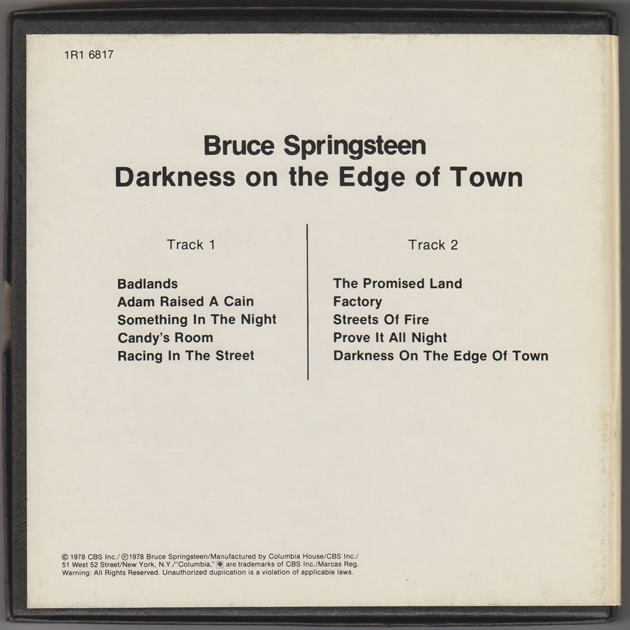


Klinger: OK, let’s start out by saying “Badlands” is the Springsteen you like. Why do I have such a problem seeing the Bruce from the Springsteens? In between those two aspects of Springsteen I find something like “Badlands”, and I’m trying to figure out if it’s the Springsteen I like or the Springsteen I could do without. I’m much more apt to really enjoy the raw energy of “Adam Raised a Cain” as opposed to the soaring melodrama of “Something in the Night”. I have a hard time taking Springsteen as a whole. I think I only really like certain things the Boss does while I can’t stand other aspects of Springsteen’s songwriting nature. What it really came down to was what song was playing at the time. And while I have enjoyed my time with Darkness on the Edge of Town, I found myself going back and forth between real exuberance for this record and something registering slightly above complete apathy. My appreciation for the Boss has increased since our last go around over two years ago. I’m just going to drunkenly chase the trolley down the street, jump on the back, and hope no one notices while I hang off the platform and wash down the rest of these Pixie Sticks with whatever is left in this bottle. I spent all of my money on candy and whiskey. So having said all that, Mendelsohn, your past experience with Bruce left you cold, but that was a long time ago and I’m sure you’ve grown considerably since then. For years, when anyone did a Springsteen parody, loving homage, or blatant rip-off, this is the sound they drew from. And epic conceptual pieces like “Jungleland” were given the old heave-ho. The twinkly piano of Roy Bittan playing off the golden-toned organ sounds of Danny Federici, the lyrics chronicling the travails of blue-collar life, and the comfort we take in knowing that there’s a Clarence Clemons saxophone solo just around every corner. Darkness on the Edge of Town to me sounds like Springsteen in quintessence, what we talk about when we talk about Bruce Springsteen. I’m inclined to say that this choice seems about right. or the grim, acoustic Nebraska (the Springsteen album that’s OK for indie types to like), but somehow we landed on 1978’s Darkness on the Edge of Town, Springsteen’s hard-earned follow-up to Born to Run. The mathematical vagaries could have delivered us to the mega-hit Born in the U.S.A. In fact, Springsteen is such a darling of the criterati that it’s more than a little surprising to me that it’s taken The Great List this long to get back around to one of his albums. His sincere sound is fully rooted in rock traditions, and his lyrics are usually reaching for Big Statements (except when they’re not, in which case they’re considered knowing riffs on party rockery). Let’s all be grateful that he, like the characters in these songs, made the most of his last chance.Klinger: For nearly 40 years, Bruce Springsteen has given countless rock critics a reason to get out of bed in the morning. Coming off two debut flops, Columbia Records was ready to drop Springsteen if his third album didn’t do huge numbers. The album becomes even better when you know how fully its making captured its themes. ‘Born to’ Run is instead a record of moments that carry you along one single journey: the introduction of Clarence Clemons’s saxophone at the end of ‘Thunder Road’ the mournful fugue that vibrates through ‘Backstreets’ the drum roll that announces the title track the operatic wails that bring the curtain down on ‘Jungleland’. It seems almost absurd to pick a best song. This is the land of ‘Abbey Road’ and ‘Nevermind’, of ‘Songs in the Key of Life’ and ‘Tapestry’: albums that earn and demand every last note. ‘Born to Run’ is, in this writer’s opinion, probably the single best rock album of the 1970s, and easily one of the finest ever recorded. Sorry-not-sorry if you wanted a more surprising pick to top this list.


 0 kommentar(er)
0 kommentar(er)
